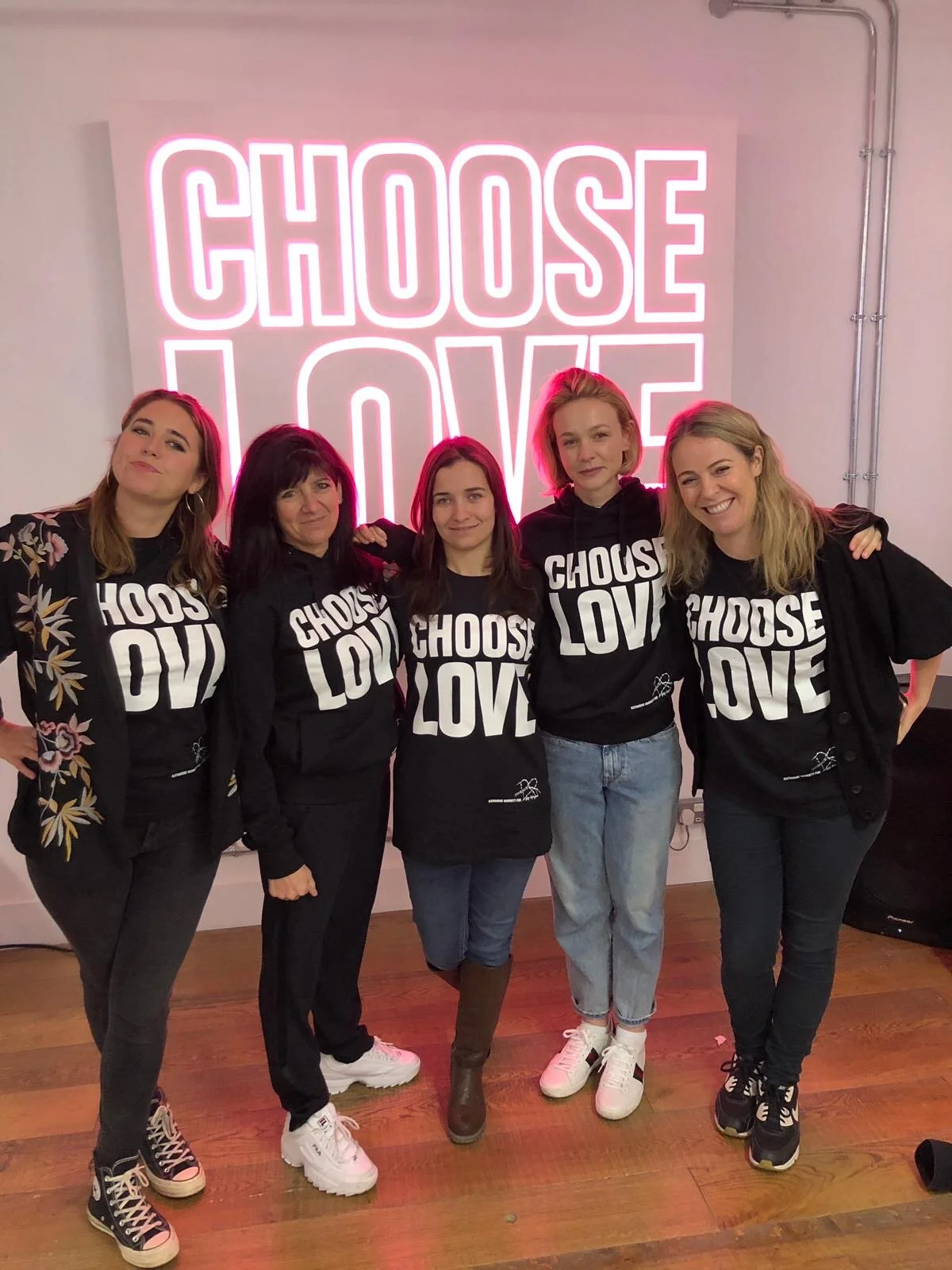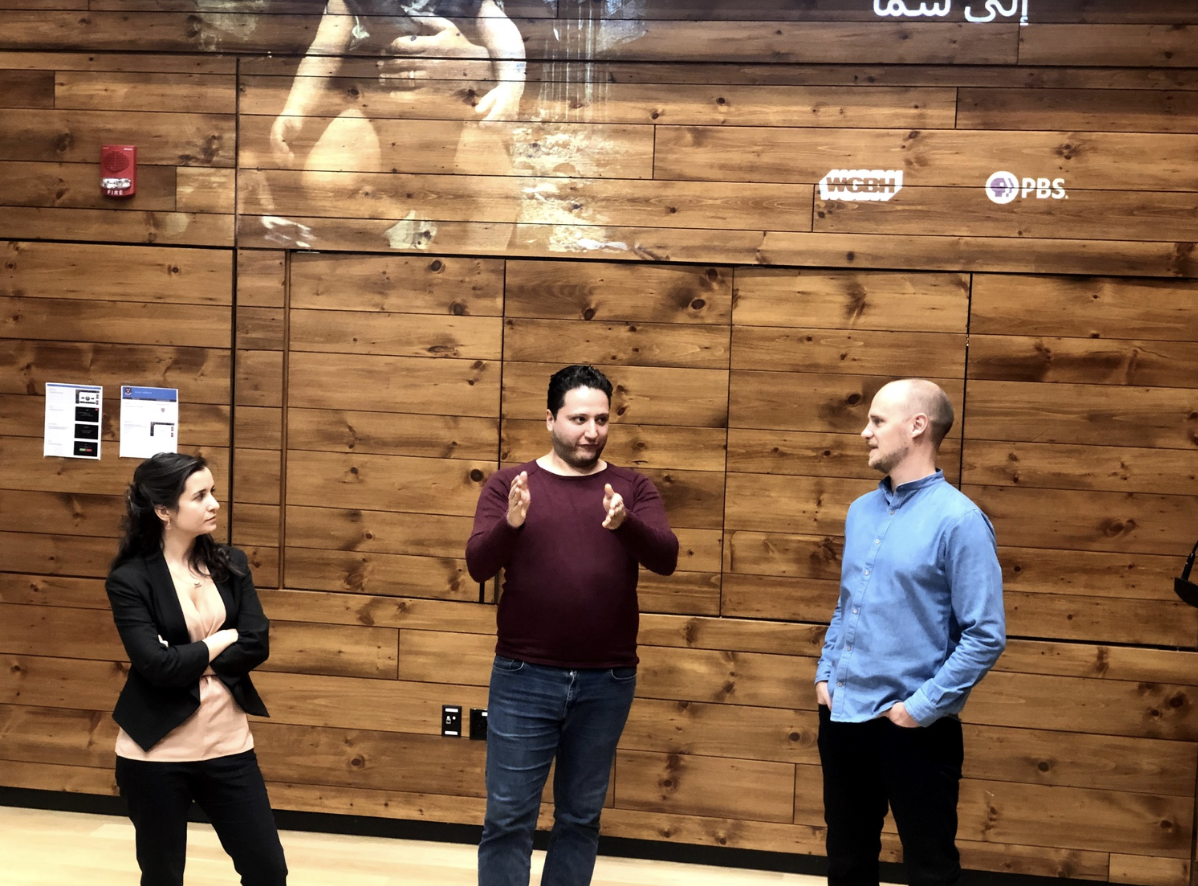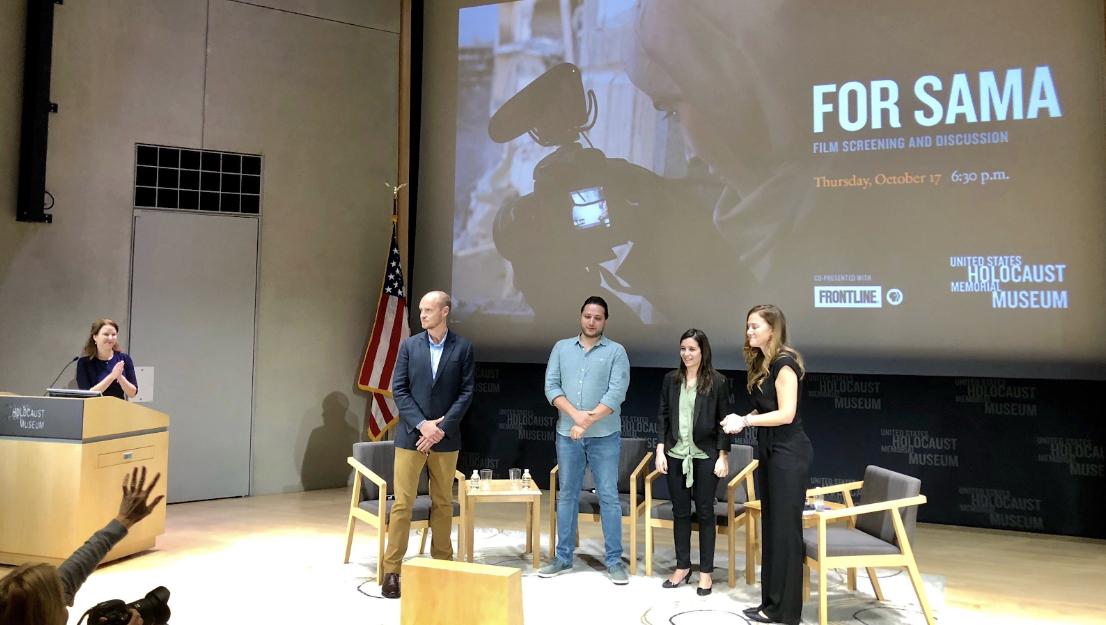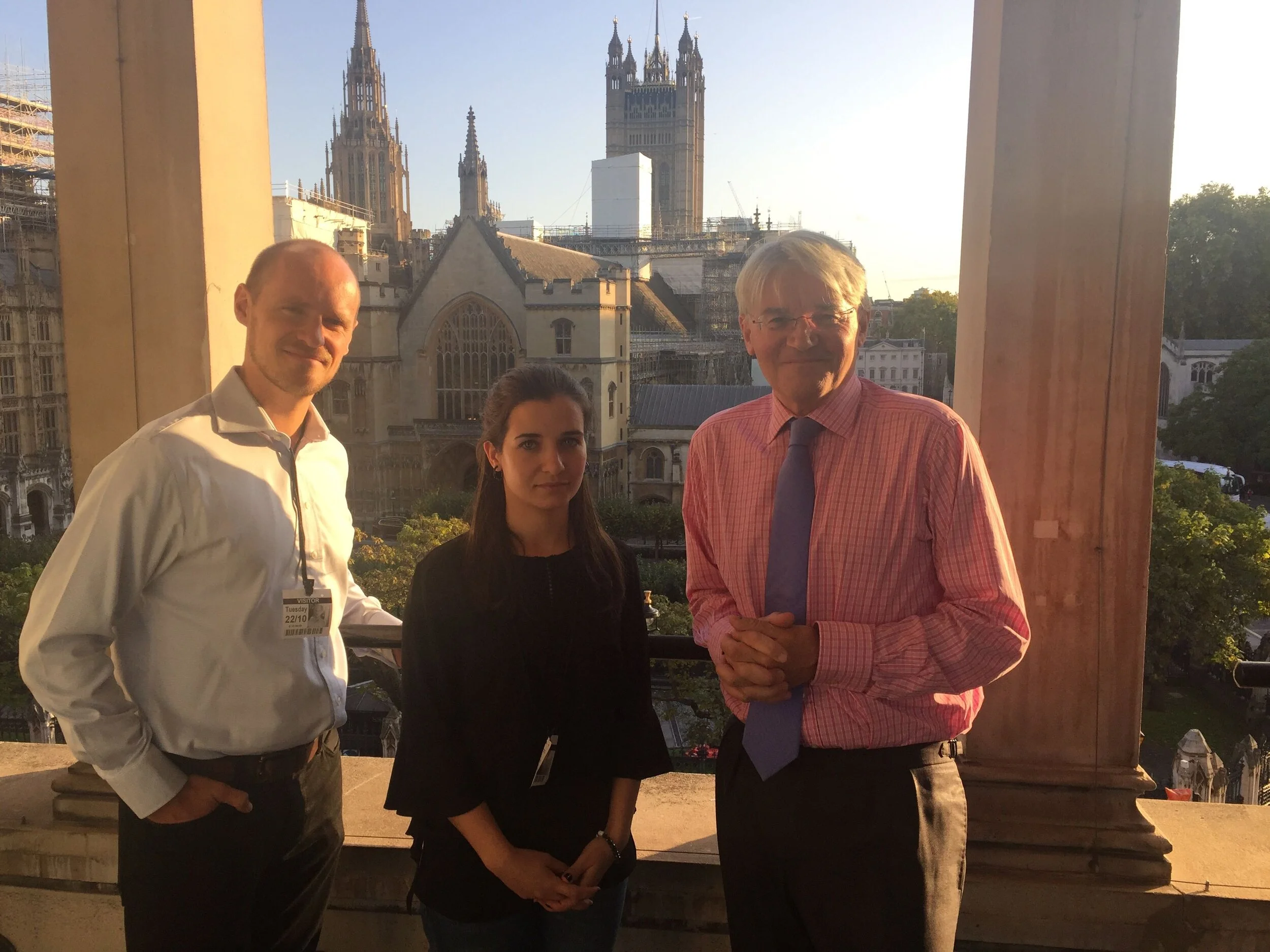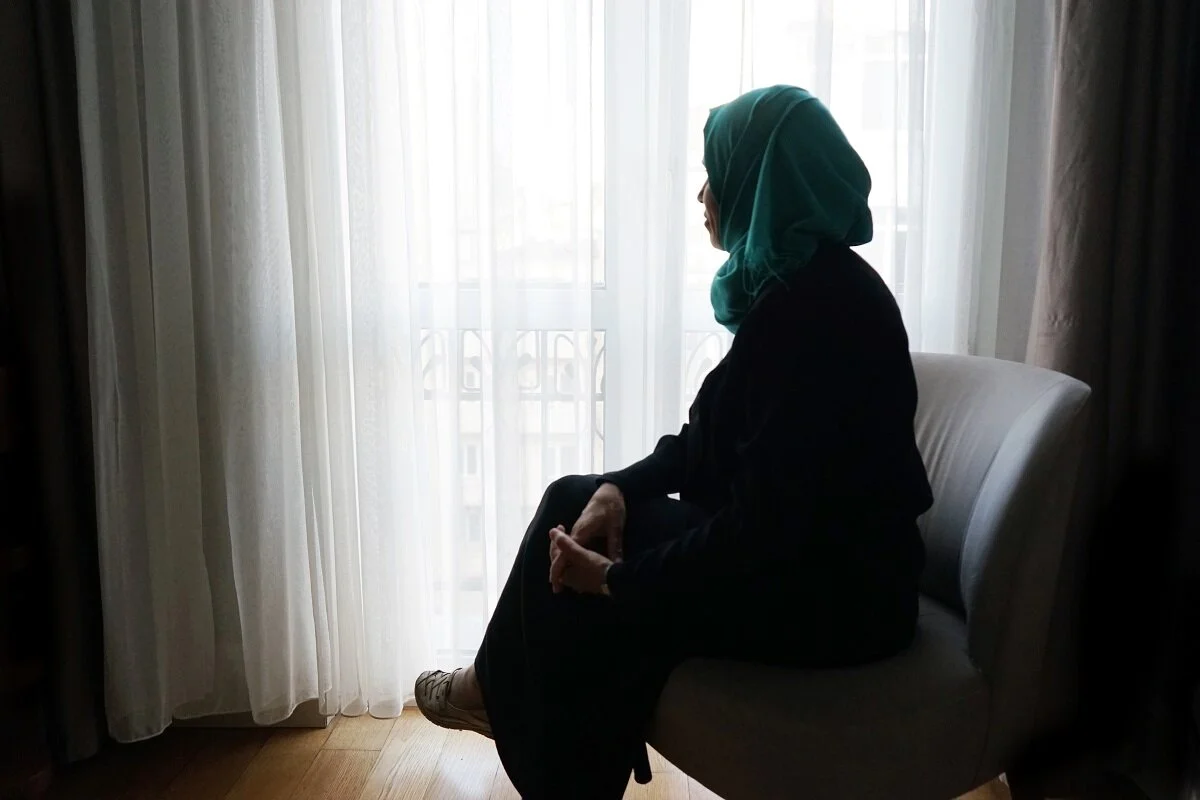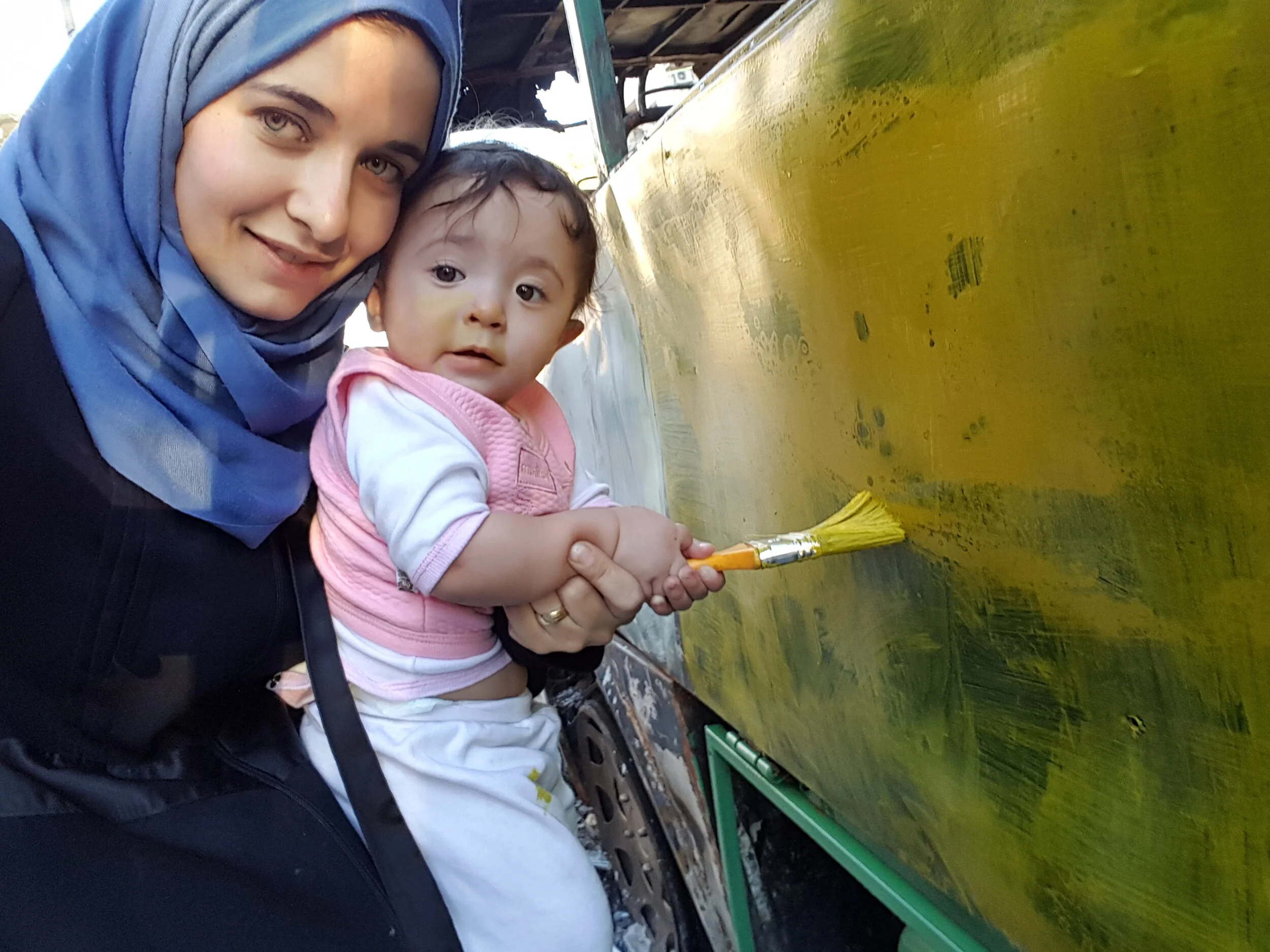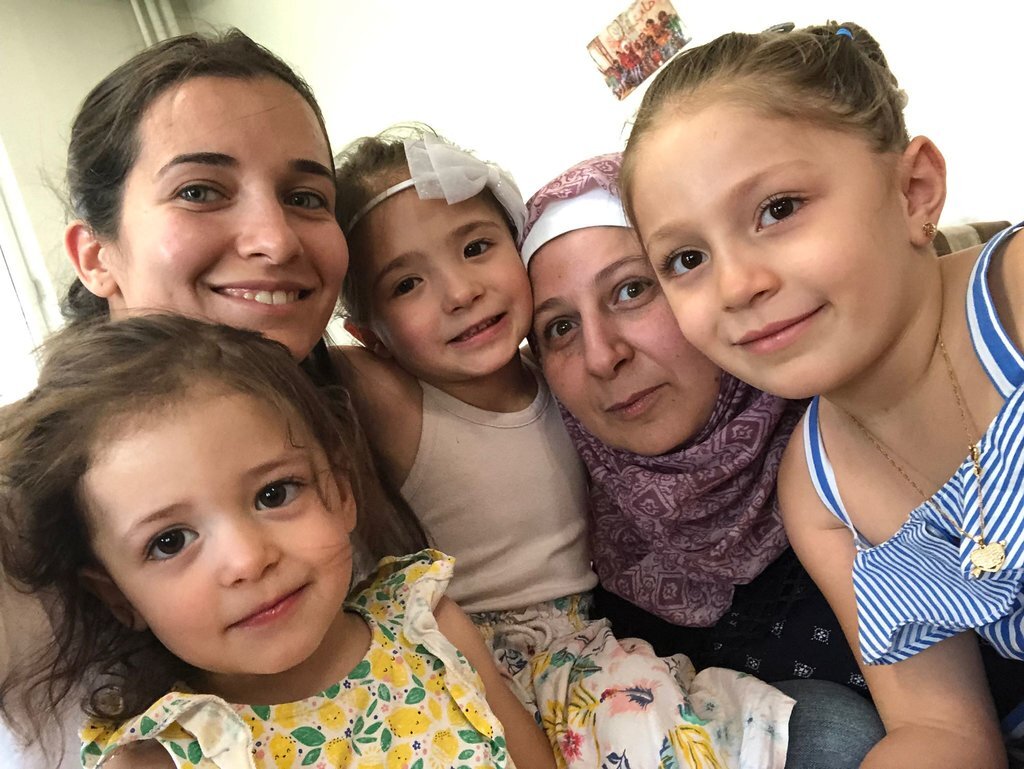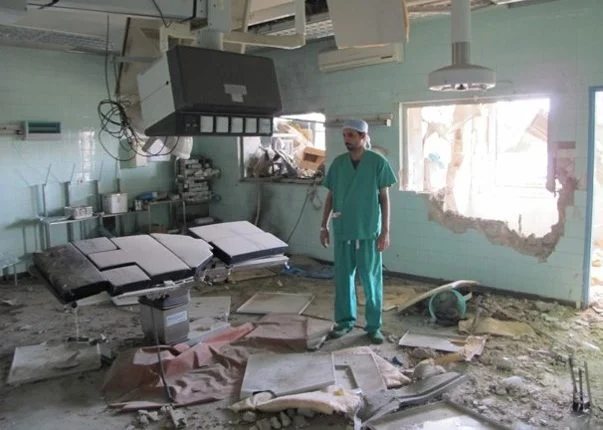
NEWS
Choose Love: Waad Takes a Tour of Help Refugees' New London Shop
UK based charity, Help Refugees, celebrated the launch of their new Choose Love stores across London, LA and New York last month.
On opening day at the London store, Waad al-Kateab was excited to head down to Neal Street to support the Help Refugees team, taking Action For Sama followers on a tour around the space via a Facebook Live (watch here).
Josie Naughton (Help Refugees), Emma Freud, Waad al-Kateab, Carey Mulligan, Philli Boyle (Help Refugees)
While visiting the Choose Love shop, Waad was overwhelmed to learn that Deborah Goldblatt, author of e-book, Syria Welcomes a Stranger (which Waad had previously contributed to) had given £10,000 of the book donations to be spent in store by Action For Sama.
With the £10,000 Waad was able to purchase £1000 on nappies, £7000 on medical care, £1000 on firewood, £1000 on hot food:
We are so excited for our friends at Help Refugees for this incredible new chapter for their work - making tangible support for refugees possible.
#ChooseLove.
Visit Choose.Love for more information.
***
Action for Sama is in an independent campaign by the filmmakers of For Sama, which aims to end the targeting of healthcare facilities in Syria. To find out more and learn how you can take action, visit actionforsama.com.
Watch For Sama on Channel 4 (UK) and PBS Frontline (US)
Team For Sama at Harvard: University Screening & Interview
Clips of For Sama were shown as part of the Lowell House Film Series at Harvard University, followed by a Q&A with Tomás Guerrero Jaramillo, who wrote up the interview as a piece for The Harvard Crimson, which is the US’s oldest continuously published daily college newspaper.
Here is the captured Q&A article, published on 19 November:
On Nov. 14, Lowell House hosted an event with Waad al-Kateab and Edward Watts, the directors of “For Sama,” which won L'Œil d'or, the Best Documentary award at the Cannes Film Festival this year. Hamza al-Kateab, Waad’s husband and protagonist in the film, was also in attendance. The film has won no fewer than 20 different awards across several film festivals around the world, including the SXSW 2019 Film Festival and the Nantucket Film Festival, and has given worldwide attention to the ongoing Syrian crisis. A Q&A session followed the screening of the snippet of the film. The Harvard Crimson sat down with Waad al-Kateab and Edward Watts to discuss their experience producing their documentary about the ongoing Syrian crisis through the five years Waad and Hamza spent living in Aleppo.
The Harvard Crimson: When did you start filming? What was the first thing you filmed in Aleppo?
Waad al-Kateab: So, in 2011 when the revolution started, I joined the protests. And it was so easy in Syria to distinguish with which side you want to be because there were normal people protesting, and there was the regime trying to make these people not ask for their human rights. So, it was so obvious that what we needed to do is to record and film these things because the regime was denying everything that was happening on the state media. Like when we were in one protest, you could see the security forces coming, beating people in the street, and killing them sometimes. And then you see the official camera of the state media coming and filming [as if to say,] “Oh, there's nothing happening here. All the videos you've seen were fake.” I started with my mobile phone, as many other activists in the university, and with time, things became bigger and bigger. Every time, there was more violence. We felt that we needed to go through to the background of these things and why they happened. Like, beyond everybody you see. There's family, memories, people, life. You need to capture the full perspective.
THC: When did it come to you mind that this footage could become a film?
WAK: It's never come to my mind! Really, for the full five years — I was just capturing as much as I could. I've worked sometimes in the news, sometimes in small, short documentaries, and all the time we were trying to do our best in very specific symbol things. I couldn't see the full picture when I was inside. So, I was just capturing, and I was pretty sure that — not just me, I think everyone who lived in those circumstances — we were feeling that we could be killed at any moment. We've never planned something for the future. Everything we were trying to do was just for today, maximum tomorrow, but nothing more. I was just like, capture this material every day put it in one hard drive, and just try to continue. If I could have sent three minutes for one of the news programs around the world, that would be amazing. But I never thought, “Oh, I want to do a film about five years, or three years, or whatever.”
Hamza al-Kateab: I think the best thing — and I’ve been, as a doctor there, filmed by several films or long reports news — and it doesn't feel real when there's a script. Like when the cameraman came with the script like, “I want you doctor to walk in the corridor. I want to check the patient. I want you to do this.” What was great about what Waad has done is that she filmed everything and then [tried] to build a story. There is no script written [demanding], “I want a child crying with his mother or something,” but when they wanted to build the story it was like, “Oh, do we have a shot of this? Do we have a clip of that? Do you want to tell another family story?"
EW: I think that is so true. And that's one of the things that makes it so real and authentic. And one of the incredible things about working with Waad was that because she wasn’t necessarily thinking “Okay, this scene is going to go here and this is going to go there,” she filmed so much. You know, so all of this richness of their lives, and of the story of what happened in Syria was gathered together. So, you know, so much of it was there, and there were so many options that we had to bring out different aspects of humanity.
THC: Two types of footage exist in the documentary, journalistic recordings of the conditions and personal videos. For example, you include videos of your daughter and videos of your wedding. How did you feel about merging those two kinds of footage?
WAK: In many places when I start filming, I was like, “Okay, I'm now here, Waad who’s trying to be a filmmaker [strictly] to document.” But in some places, I felt that the camera became part of my life and my body. For example, in the poster itself, there is me, Sama, and the camera. I felt like these three elements changed the whole of my perspectives. And so far, I still see everything as a frame. It was all the time like I was trying to live my life normally as Waad, the mother of Sama, sometimes just the wife, sometimes just the young woman. And then trying to capture these amazing minutes in my life. Which means, for me, that if I couldn't really survive, this is will be protected and no one can deny this. But at the same time, I was trying to be Waad, the journalist, trying to capture real stories. And when we were trying to do the film, it was so obvious that to give people the full perspective, it needed to be a mix between Waad the journalist and Waad the mom. That's what we try to reflect in the film.
THC: When did you start putting these different clips together? When did it become the film?
WAK: So, when the film finishes, the last thing is when we left Aleppo. So, after I left, I was filming the whole five years. I was working in 2016 at Channel Four News in the UK. They have a program every day, and I was sending them some small stories which worked for the news. Because I have a good relationship with them, I went to the UK in February 2017 — it was just one or two months after we left Aleppo. And we were speaking more about doing longer news reports. Then I showed them some of the material that I have — I’ve done with them around 25 reports. We put them all in one website called “Inside Aleppo,” like a series of news reports — so at that time when we felt that this could be a very big project, they introduced me to Edward who worked with them before. I couldn't do the story by myself. I was just left so emotional. I don't have the good experience to do that big project alone.
EW: You know, people — because of the scale of Waad's archive and what they lived through — I think everyone was thinking, “This feels like it should be a bigger piece.” That was one of the reasons they called me. But no one knew what it would be. Would it be on TV? You know, how long would it be? But I think we certainly felt from minute one — I definitely did — that it should be a piece of cinema, that it should be a long film because — just the stuff she captured and what she lived through — it felt that that was the appropriate platform, that it should be as long a film as possible to tell the story properly.
THC: Now that you have been able to share your film with the world, what’s next?
WAK: So, for the situation itself: This is still happening now. And I'm so happy to be a filmmaker and to do more films. But for me, I’m here just because of what I went through, because of a cause which I truly believe in. So I will try in my personal future — and with the experience that I have now, and with lots of good things which I'm now getting — to continue to do more stuff about Syria, because there are thousands of hundreds of stories to be told. The film itself now is doing very well around the world. So, what we are trying to do is to use it as a tool to shed light on what's happening in Syria right now. The impact campaign we're trying to do, which is “Action for Sama,” is focusing on the situation right now in Syria, about the attacks on hospitals and health facilities, which is happening a lot now. So, we work with many partners located in the U.S. and in the U.K. — one of them is Physicians for Human Rights. So, I think I still feel that there's a lot of work to do — all the details of what's happening in Syria, for accountability, for justice.
Lowell House is planning to have a full screening of “For Sama” before the end of this semester so that students can watch the documentary in its entirety.
https://www.thecrimson.com/article/2019/11/19/waad-al-kateab-interview/
FOR SAMA at the US Holocaust Memorial Museum
On October 17th, 2019 The US Holocaust Memorial Museum in Washington D.C. hosted a screenign of FOR SAMA and a panel discussion with the filmmakers.
The US Holocaust Memorial Museum is living memorial to the Holocaust that inspires citizens and leaders worldwide to confront hatred, prevent genocide, and promote human dignity and the venue is a reminder of the need to combat the human rights atrocities still taking place today, as seen in the film.
Welcome remarks were made by Raney Aronson-Rath, Executive Producer at FRONTLINE PBS, who said “This is much more than just a film: It's an unforgettable journey that places you at the heart of one of the most tragic conflicts of our time."
The evening’s programme encompassed an opening statement to intorduce the film by Ms Halina Peabody, a Holocaust Survivor and Volunteer at the US Holocaust Memorial Museum. Her full speech can be viewed here.
After the film screening, Naomi Kikoler, Director of the Simon-Skjodt Center for the Prevention of Genocide at the Museum, hosted a panel disucssion with Waad al-Kateab, Ed Watts and Dr. Hamza al-Kateab. The Museum’s Simon-Skjodt Center is dedicated to stimulating timely global action to prevent genocide and to catalyze an international response when genocide does occur.
Ms Kikoler closed the discussion by saying “the legacy of this work is going to live on for future generations and you have helped to set a historical record and hopefully it will also help to advance justice and the creation of a more fair Syria, one in which you're able to go home or other colleagues are able to go home, live and thrive in a diverse society, so it's an incredible honor and privilege for us to be able to host you tonight.”
Watch the full discussion on Youtube here.
***
Action for Sama is in an independent campaign by the filmmakers of For Sama, which aims to end the targeting of healthcare facilities and civilians in Syria. To find out more and learn how you can take action, visit actionforsama.com.
Watch For Sama on Channel 4 (UK) and PBS Frontline (US)
MPs Experience For Sama in UK Parliament
On 8 October 2019, a special screening of For Sama and panel discussion with the filmmakers took place in the Attlee suite in Portcullis House, Westminster, marking the official launch of the Action For Sama impact campaign.
In attendance were a number of UK Members of Parliament, representatives from UK-based national and international NGOs and UK-based representatives from policy organisations whose work focuses on Syria.
FOR SAMA was introduced by Channel 4 News Editor Ben de Pear, and post screening, a panel discussion featuring Waad al-Kateab and Edward Watts was moderated by XXXX.
Among those in attendance, several members of Parliament expressed their support for the campaign, including Alison McGovern and Andrew Micthell. Ms McGovern is pictured below with the Action For Sama sign urging governments to take a stand to help #Stop Bombing Hospitals.
Member of Parliament Alison McGovern on 8 October 2019.
Mr Mitchell voiced his solidarity with the demand to stop impunity and additional conversations with him on the day subsequently led to a meeting with the filmmakers and representatives from Action For Sama campaign at his office.
Edward Watts, Waad al-Kateab and Andrew Mitchell
After this meeting, Mr Mitchell tabled a question in Parliament on 22 October 2019, the details of which are included here:
Question from Mr Mitchell: Tabled on: 22 October 2019
To ask the Secretary of State for Foreign and Commonwealth Affairs, with reference to the decision taken at the National Security Council in 2012 to collect and store evidence of breaches of international humanitarian law perpetrated during the Syrian conflict, what steps the Government is taking to use that evidence to tackle a culture of impunity. (3591)
Answer: Dr Andrew Murrison: Submitted on 28 Oct 2019
The UK is committed to highlighting the appalling violations of international humanitarian law in Syria and to seeing those responsible held to account in the most appropriate jurisdiction. We are providing both political and financial support, including £950,000 to
date, to the work of the UN International Impartial and Independent Mechanism which is gathering evidence for the prosecution of persons responsible for the most serious crimes under international law in Syria. This is part of the over £9 million that the UK has contributed since 2012 in support of efforts to gather evidence and assist victims of human rights abuses and violations.
Action For Sama are committed to engaging Members of the UK Parliament in future conversations to end the culture of impunity around war crimes being committed in Syria and to support the demand for accountability to further the international demands of the campaign. Additional screenings of For Sama as part of advocacy-based engagement for the campaign will be planned for 2020.
***
Action for Sama is in an independent campaign by the filmmakers of For Sama, which aims to end the targeting of healthcare facilities and civilians in Syria. To find out more and learn how you can take action, visit actionforsama.com.
Watch For Sama on Channel 4 (UK) and PBS Frontline (US)
Our Syria: "It is NOT a 'Civil War'"
Waad al-Kateab & Hamza al-Kateab
Written by Waad al-Kateab
"It is not a civil war.”
We see it time and time again. In articles about Syria; articles about us and our film. These articles report the situation in Syria as a ‘civil war’. This is not right. This is misinterpreted information and it can be incredibly dangerous.
We refuse the use of the term “civil war” to describe what happened in Syria and here is exactly why:
- Civil war usually takes place between societal groups on sectarian, racial and ethnic grounds, which is not the case in Syria. What happened in Syria was a popular uprising initiated by all the groups of the society, against a ruling regime to which it responded by deepening the latent contradictions within the Syrian society, by agitating all the pre-civilian feelings and marginal loyalties to the extremes. This included the sectarian, ethnic and class feelings, even the sensitivities between the rural and urban population.
But, all this did not succeed in transforming the conflict in Syria into a “civil war” with the traditional sense of the term, i.e. mobilizing a societal group against another on sectarian grounds. Therefore, describing the conflict in Syria as a “civil war” complies totally with what the Syrian regime was pushing to prove, although it doesn’t apply to what happened in reality.- In one stage of the conflict in Syria, attention was directed mainly on ISIS (Daesh) and other terrorist groups. The whole world started dealing with the situation in Syria from this perspective, insisting, at the same time, to using the term: “Civil War”. Strangely, using this term in this context reflects a false and dangerous perception. It gives the impression that ISIS, a representative of the Sunni sect in Syria, is fighting with all the other Syrian sects, which is completely and definitely untrue.
Many studies dissecting the social and organizational structure of ISIS asserted that it is a strange body not connected to the Syrian society by any means. The chronology of events showed that the Sunnis in Syria were the first who revolted against ISIS- even before the formation of the “International Coalition”.
Lately, the war in Syria developed into a new stage, a war of the strangers on the Syrian ground. Today there are many armies participating in the war in Syria; the Russian, the Iranian, the Turkish, The American and others, confirming the Arab motto: “tyrants allure raiders”, which describe exactly what happened in Syria. Therefore, we can assert that all aspects of the civil war are absent with the state of internationalization and presence of foreign armies on the Syrian soil, and also against the just cause of the Syrian people already supported by the international resolutions, the Geneva Communique and the UNSC Resolution 2254.
Based on this, we can use many terms describing what is taking place in Syria, we can call it a war, a conflict, a struggle, whatever. We classify it as a revolution, and firmly refuse to describe it as a civil war.
In Arabic:
منشوفها دائماً مرّة بعد مرّة, بمقالات عم تحكي عن سوريا, عم تحكي عنا, وعم تحكي عن فلمنا, هي المقالات بتعرّف الوضع
بسوريا على أنو "حرب أهلية" وهاد ما صح, هاد فهم وتعريف خطأ للوضع بسوريا وهو شي خطير كتيرنحنا منرفض مصطلح "حرب أهلية" لتوصف يلي عم يصير بسوريا, وهي الأسباب:
- الحرب الأهليّة تجري عادة بين فئات مجتمعيّة على أسس طائفيّة أو عرقيّة أو قوميّة، وهذا ما لم يحدث في سوريا. ما حدث في سوريا هو انتفاضة شعبيّة شارك فيها مختلف أطياف المجتمع ضد نظام حكم، وقد استجاب لها النظام بأن عمل على تغذية التناقضات جميعها داخل المجتمع السوري وعلى استفزاز المشاعر والانتماءات ما قبل المدنية إلى الحد الأقصى. شمل ذلك المشاعر الطائفية والقومية والطبقيّة وحتى تلك المتعلّقة بالريف بمقابل المدينة، إلا أن كل ذلك لم ينجح في تحويل الحرب في سوريا إلى "حربٍ أهليّة" بالمعنى التقليدي للمصطلح، بما يعني بأنّه اصطفاف فئة مجتمعيّة ضد أخرى على أسس فئوية ضيقة. لذا فإنّ هذا الوصف (الحرب الأهليّة) يوافق تماماً المسار الذي دفع (ويدفع) نحوه النظام السوري، لكنه لا يتناسب مع طبيعة ما جرى.- في مرحلة من مراحل الصراع في سوريا تحول الاهتمام بشكلٍ رئيسي إلى "داعش" والمجموعات الإرهابيّة، وأصبح العالم ينظر إلى الأحداث في سوريا من هذه الزاوية بشكلٍ رئيسي، ويصرّ بذات الوقت على استخدام مصطلح "الحرب الأهلية". المستغرب هنا أن استخدام هذا المصطلح ضمن هذا السياق يعطي صورة مغلوطة وخطيرة، إذ أنه يصوّر داعش على أنها ممثلة لفئة طائفية هي "السنّة" في سوريا والتي تتنازع مع بقية الطوائف، وهذا طبعاً غير صحيح طبعاً. تظهر العديد من الدراسات التي شرّحت البنية المجتمعية والتنظيمية لداعش أنها جسم غريب عن المجتمع السوري، كما أظهرت مجريات الأحداث كيف أنّ السنّة في سوريا كانوا أوّل من انتفض على داعش، حتى قبل تشكيل التحالف الدولي.- تطوّرت الحرب في سوريا واتخذت شكلاً مختلفاً مؤخراً، وأصبحت السمة الأساسيّة لها بأنها حرب الآخرين على أرضنا. هناك اليوم العديد من الجيوش التي تشارك في الحرب في سوريا منها الروسي والإيراني والتركي و الأميركي وغيرهم. كما يقولون فإنّ الطغاة يجلبون الغزاة، وهذا ما حدث تماماً في سوريا. وبالتالي فإنّ السمات "الأهليّة" للحرب هي الأقل حضوراً أمام التدويل والحضور الأجنبي، وأمام القضية العادلة للشعب السوري والذي تصونها المقرّرات الدولية كبيان جنيف وقرار مجلس الأمن 2254.- لذا، يمكن أن نستخدم العديد من المصطلحات في وصف ما يحدث، يمكن أن نقول عنها حرباً، أو صراع، أو فوضى، أو قل ما شئت. نحن نسميها ثورة، ونجزم أنها ليست بالتأكيد حرباً أهلية
***
Action for Sama is in an independent campaign by the filmmakers of For Sama, which aims to end the targeting of healthcare facilities in Syria. To find out more and learn how you can take action, visit actionforsama.com.
Watch For Sama on Channel 4 (UK) and PBS Frontline (US)
How the Syrian Government Targets Health Workers for Arrest, Detention, and Torture
“My Only Crime Was that I Was a Doctor”
How the Syrian Government Targets Health Workers for Arrest, Detention, and Torture
Source: Physicians for Human Rights
Since 2011, the Syrian government has systematically targeted civilians: besieging and cutting off supplies in opposition-held areas, bombarding densely populated centers, and arresting, detaining, and torturing protesters and their allies. Among the victims of such crimes are Syrian health care workers, targeted for providing medical care to injured civilians during the conflict.
LEILA
PHR’s new report “My Only Crime Is That I Was A Doctor” is the first investigation to document the purposeful, brutal, and illegal strategy of the Syrian government to target health workers for arrest, detention, and torture. PHR conducted semi-structured interviews and brief psychological assessments of 21 Syrian health care workers. These interviewees – physicians, medical volunteers, pharmacists, paramedics, and psychiatrics – were formerly arrested and tortured by the government’s security forces. For months, or even years in some cases, survivors of torture endured daily beatings, public humiliation, and high-voltage electrical shocks.
It’s time for the truth behind the systematic persecution of health workers in Syria to be revealed and made public. Help us share their testimonies and demand accountability for human rights violations.
READ THE FULL REPORT HERE
***
Action for Sama is in an independent campaign by the filmmakers of For Sama, which aims to end the targeting of healthcare facilities in Syria. To find out more and learn how you can take action, visit actionforsama.com.
Watch For Sama on Channel 4 (UK) and PBS Frontline (US)
After ‘For Sama,’ a Syrian Family Finds Refuge in London
Source: The New York Times. By Eleanor Stanford. Wednesday 20 November 2019.
As Waad al-Kateab’s intimate documentary about life during the Syrian uprising airs on PBS, she discusses what her family’s day-to-day looks like as refugees in England.
This article contains spoilers for the documentary “For Sama.”
How do you get viewers to care — really care — about things happening on the other side of the world?
This was a question the journalist and filmmaker Waad al-Kateab and her co-director Edward Watts grappled with as they started sifting through 500 hours of footage of the Syrian uprising. Starting in 2011 as a university student, al-Kateab had filmed her life in Aleppo, recording the protests and violence that surged through the city (her footage and reports occasionally ran on Britain’s Channel 4 during the Syrian civil war).
She also documented her wedding day, dinners with friends and her pregnancy, but “I was clear that I wanted the film to be more about the city,” she said in a recent interview. “I didn’t want to be the center of the story.”
But the filmmakers soon realized that a documentary about the mundane as well as the devastating moments of civil war, a film that felt like al-Kateab taking viewers through five years of her family’s life, would create a powerful portrait of a culture’s destruction. “For Sama,” which debuted this week on PBS’s Frontline and is available to stream on the Frontline website and YouTube, is startlingly intimate, combining al-Kateab’s footage with her frank narration about the conflict and her fears surrounding how it will affect her family. (“What a life I’ve brought you into,” she says about her daughter at one point. “Will you ever forgive me?”)
The film closes with al-Kateab, her husband, Hamza, and their daughter Sama safely escaping Aleppo and arriving in Turkey. A second daughter, Taima, is born soon after. Since then, the family has claimed asylum in England, and today they live in London.
“For Sama” had a theatrical release earlier this year, but al-Kateab said over the phone that it was important for her that people could now watch the film in their own homes, and wonder, “What if this happened to me? To the place that I love?”
She also discussed how she hopes the film and the campaign Action for Sama, which raises money to support humanitarian workers in Syria, will keep the ongoing Syrian conflict in the public eye, how her daughters saved her and her husband and what the family’s day-to-day life looks like now. These are edited excerpts from the conversation.
The film is presented as a love letter to your daughter, Sama, but it also feels like an act of resistance, in that you were filming protests the regime claimed weren’t happening.
A lot of people have told me, your activism is something, and the film is something else. But for me, it’s really the same. I would not do this if I wasn’t an activist.
At the beginning of the filmmaking, I was so desperate, and I didn’t know if the film would create any change, and I didn’t want to have any expectations, especially when I had just left [Aleppo]. I lost everything. I didn’t know if I could stand up again. I started to do the film because I felt like it was the only way for me to keep going. I did it just to be a record, even to put in one library and to say this is one story of Syria.
Our hope is that the film is not just a film. People can watch it, but also it’s a tool for change. It can push people to do something. It will not be just something people watch and forget. That is also why we set up Action for Sama, a campaign to stop the targeting of health care facilities in Syria.
Why did you and your husband, Hamza, decide to share so much of your lives with the film’s audience?
Really, I feel like people know very few things about what happened with us. It’s five years. I have like 500 hours of footage. You’ve seen just 95 minutes. So people may feel like they know us really well, but this is just the general things that anyone could know about our life as people who lived in that situation.
People know that people bring children into situations [like the Syrian uprising], but they have thousands of questions about why people do that, so for me, everything personal is really already public.
From left, Taima, Waad and Sama al-Kateab with Afraa Hashem and her daughter Naya al Altrash, who also featured in “For Sama.” Waad and her family visited Afraa and her family in Turkey in August this year. Credit: Waad al-Kateab
Stories become more resonant when there is a character to connect with, rather than just facts.
There’s a fear in the whole world about refugees and people who are the other. The film is just fighting this in a very simple way, in that you feel that you know these people, and you care about them. You need them to be like part of your life, or you need to be part of their life.
You and your family are now living in London. How was your experience getting asylum?
Everything was easy for us, not like for other people. I know many people stuck inside Syria now, or in the camps, or in Turkey.
I had been working with Channel 4, so I had access to a visa to come to the U.K. After one year of living in Turkey, in May 2018 we came to Heathrow Airport, and claimed asylum there.
One thing, though, was that when we came to England, I couldn’t bring my second daughter, Taima. She was almost 1 year old, and she had no papers. The only paper I had was from the hospital saying I had had a child, but they didn’t even put the name of the child. I tried to go to the Syrian embassy for help, but they wouldn’t help, because Hamza was wanted by the regime [for his role in the uprising].
My passport, Hamza’s passport and Sama’s passport were almost expired, and once that’s happened, there’s no option to get another passport, so I had no option but to leave. So I left Taima in Turkey for five months until we were granted asylum, and I could bring her to England on a temporary travel permit from the U.K. I try not to think about that time too much. I’m just glad that nightmare is finished.
Do you and your family hope to return to Syria?
Of course. Not just because it would mean seeing my home, but because for all of us who stayed till the end, being out of Syria is not something that we want. But we had no other option.
Even in Turkey, it’s not that good of a life, even if you are safe. You feel that you are besieged in a different way. Your right to stay and your right to leave and your right to do anything, even to work … it’s so hard to have legal things.
We don’t want to be taking money from aid. We want to work. There are a lot of things we can do — Hamza is a doctor. But as refugees, there is nothing stable at all, and you have to just find individual ways to survive.
What has your experience of living in London been?
Moving here didn’t feel like the perfect decision at the time, especially with Brexit. But it has been a very different experience to what I expected. People have been so kind. After my neighbors watched the film on Channel 4, they left great messages outside of my door the next day, it was just so lovely.
For me, Aleppo and Syria will always be my first home, but I really feel like here in England I have a second home.
How connected do you still feel to Syria and the changing political landscape over there?
Making and promoting the film has been good in that you feel like you’re not separate from what’s happening. You’re still fighting and doing something even if you’re out [of Syria]. Even though I’ve had to leave, this has stopped me feeling hopeless.
The film is a chance for Syria to be back in the news, when everyone feels like the world is ignoring what’s happening in Syria. This is our story, and seeing people still caring and engaged, it’s an amazing feeling. With everything that’s happening in Syria, you need all the time to keep pushing back to the same one line: Nothing has changed.
What are your and Hamza’s work plans going forward?
I got a scholarship for university for a masters in media communication and development. I haven’t studied anything now for like seven years, and I was doing marketing before, which is something totally different.
It’s so important for us to think about how media and journalism could be developed in places like Syria. And also, it’s not just that the world was watching us through their perspective, but also we are watching the world from our perspective. There are so many things I want to do, but I can’t complain. That’s one of the advantage of what we went through: You can’t complain.
Hamza is working for a company that provides banking in conflict areas. Next year he will do a masters in public health.
How are the girls enjoying London?
Sama is 4, and Taima is 2 and a half. They’re enjoying everything so much. They switch between English and Arabic — Sama has started correcting our spelling. And she has a British accent, I’m like no, please no! [Laughs.]
Last week was Halloween, and they were celebrating Halloween for the whole month, oh my god. They slept in their witches’ dresses for the whole week.
We had a really hard time after we left [Aleppo] with Sama. She had nightmares. But she’s doing really, really well now. Children surprise you. I’m sure that me and Hamza stand up now because of them. You need to find hope everyday when you wake up, and with children you just keep going for them.
Syrian regime targets hospital and refugee camp, killing at least 22
“At least 22 civilians have died after the Syrian government shelled a displacement camp and hospital, rescue workers and residents have said, as Bashar al-Assad continues to pound the last pocket of opposition-held territory in the country."
Source: The Guardian By Bethan McKernan Middle East correspondent. Thu 21 Nov 2019 16.12 GMT.
At least 22 civilians have died after the Syrian government shelled a displacement camp and hospital, rescue workers and residents have said, as Bashar al-Assad continues to pound the last pocket of opposition-held territory in the country.
The camp hosting 7,000 people near the village of Qah in Idlib province was hit by a ground-to-ground missile on Wednesday night carrying illegal cluster-bomb submunitions. The attack killed at least 16 people, injured dozens more and started fires which blazed through the flimsy tents.
Another rocket damaged the Qah maternity hospital 30 metres away from the camp, killing two women and six children and injuring four medical workers, the Syrian American Medical Society (Sams) said in a statement. All patients were evacuated and the facility has now been abandoned.
Earlier on Wednesday, Russian military aircraft targeted the town of Maaret al-Numan in southern Idlib, killing six.
“All the children started crying, people started running towards the olive orchards trying to escape,” said Zaher Ghara’a, a 42-year-old resident who has lived in the camp for six years.
“I saw tents burning then heard the White Helmets [Syrian civil defence service], ambulances and fire engines approaching. My cousin’s van was damaged but the tyres were still good so he helped transporting people to hospitals. It was covered in blood by the time he finished.”
It took two hours to extinguish the fires and evacuate the wounded, said Ibrahim Abu al-Laith, a White Helmets spokesman, adding that the area was still off-limits on Thursday due to unexploded ordnance.
Bombardment by Assad’s forces and his Russian allies has killed more than 1,300 people and sent almost 1 million fleeing to the Turkish border since an attack on Idlib and the surrounding countryside began in April.
Wednesday’s attack on Qah, however, was much further north than the campaign’s parameters to date, sparking fears that the already ferocious assault could escalate.
Aid agencies have repeatedly warned that attacking Idlib puts the lives of 3 million civilians in danger and could trigger the worst humanitarian disaster of the almost nine-year war to date. Originally home to about 1 million people, the province’s population has been swollen with civilians displaced by fighting elsewhere in the country.
The incident at the Qah clinic marks the 65th attack on 47 health facilities in the area since April.
The facility was supposedly on a UN no-strike list shared with parties active in Syrian airspace, but Damascus and Moscow have been repeatedly accused of using the GPS coordinates to deliberately target civilian infrastructure.
“I think the regime targeted this camp on purpose,” said Dr Muheeb Qadour, the director of nearby Atmeh hospital, who rushed to the scene to help.
“The hospital is just for women and children and it’s near the border, away from the frontline. There are no military headquarters in this area.”
A ceasefire deal brokered by Russia and Turkey in September last year was supposed to save Idlib from the impending regime attack, but it unravelled after the hardline Hayat Tahrir al-Sham (HTS) wrested control of the area from more moderate rebel groups in January. A Russian-announced unilateral ceasefire in August was also never fully implemented.
Many in Idlib have expressed anger at Turkey, which backs Syria’s opposition groups, for abandoning them to focus on Ankara’s new campaign against western-backed Kurdish forces in Syria’s north-east, where it is relying on Russia to act as a mediator.
“Turkey is the guarantor of the alleged ceasefire but the regime and Russia haven’t abided by the agreement,” said Ghara’a. “It’s just a weak excuse, a trick.”
Additonal reporting by Hussein Akkosh
PHYSICIANS FOR HUMAN RIGHTS: STAND WITH PHR AGAINST INJUSTICE
Physicians for Human Rights is a US-based not-for-profit human rights NGO that uses medicine and science to document and advocate against mass atrocities and severe human rights violations around the world, with a focus on attacks on healthcare in Syria.
Action For Sama are thrilled to partner with Physicians for Human Rights as the organisation documents attacks on healthcare facilities and the killing of medical personnel in Syria. Using evidence rooted in science as a critical tool to establish a fact-based record of human rights abuses and make human rights violators accountable for their crimes.
Photo credit: Physicians for Human Rights
By calling attention to these crimes and securing evidence to hold perpetrators accountable in future national or international justice processes, Physicians for Human Rights are an integral part of how Action For Sama plans to call for justice and accountability for the Syrian people.
For example, Physicians for Human Rights have researched, documented, and mapped widespread and systematic attacks on medical infrastructure in Syria since March 2011, amounting to 583 attacks on at least 350 separate facilities from March 2011 through August 2019. As you can also see on our About Syria page (link), their interactive map of Syria provides location information and details on attacks which Physicians for Human Rights was able to independently corroborate – 90 percent of which have been committed by the Syrian government and its Russian allies.
We at Action For Sama look forward to sharing more information and fact-based evidence from our partners Physicians for Human Rights and we urge you to follow them and spread awareness of their incredible work by sharing suggested posts below:
Tweet:
@ActionForSama is proud to partner with @P4HR to #StopBombingHospitals. @P4HR documents and advocates against atrocities such as current bombings in #Syria. Find out more about their crucial work here https://phr.org/ #ForSama #ActionForSama
Facebook: Action For Sama and Physicians for Human Rights
@ActionForSama is proud to partner with @physiciansforhumanrights in #ActionForSama’s campaign to #StopBombingHospitals. @physiciansforhumanrights uses science and medicine to document and advocate against human rights atrocities such as the current bombings of civilians and healthcare workers in #Syria. Find out more about @physiciansforhumanrights crucial work in Syria here https://phr.org/ #ForSama #ActionForSama
MOLHAM VOLUNTEERING TEAM: INSPIRE YOUR HUMANITY
Founded in 2012, the Molham Volunteering Team is a nonprofit organisation registered in France, Turkey, Jordan, Sweden and Canada. The organisation’s aim is to provide aid to internally displaced persons in Syria and to Syrian refugees living in camps of neighbouring countries.
The Team is named in honour of Molham Traifi. An exceptional young man from the city of Jableh, he was among the first voices calling for freedom and defying the Syrian regime that detained and tortured him for almost a month. Upon his release in June 2011, he spent a few months with his family in Saudi Arabia, but as he could not not bear to leave his country behind, he returned to Syria, risking his life to continue serving others. Molham was killed in government shelling on the city of Salma, Lattakia on June 10, 2012. Determined to honor him and carry his legacy, a group of his friends founded “Molham Volunteering Team” on October 26, 2012.
Photo credit: Molham Vounteering Team
Since 2012, the team has grown and now consists of 180 volunteers from all around the world working together to deliver basic necessities to Syrians in need. The Molham Volunteering Team launches emergency campaigns to provide humanitarian relief and address the needs of civilians in distressed areas and does so in an independent way, free of any political orientation or partisanship.
Action For Sama has great respect for the expanding role that Molham Volunteering Team has taken on within the field of humanitarian aid. For example, Molham Volunteering Team is currently providing food and core relief items to displaced families in the Idlib region, which is suffering from the Syrian government’s escalated attacks since April 2019.
If you would like to help Action For Sama share awareness of the amazing work that Molham Volunteering Team are doing, we have included some social media examples for you to show your support:
TWEET:
Join @ActionForSama in acknowledging @molhamteam‘s amazing humanitarian work to help people in need in #Syria. #ActionForSama #ForSama #MolhamTeam #StopBombingHospitals
FACEBOOK: Action For Sama
Join @ActionForSama in acknowledging the amazing humanitarian work of @molhamteam to help the people of Syria. Learn more about #MolhamTeam’s humanitarian work to help provide aid to Syrian civilians.

